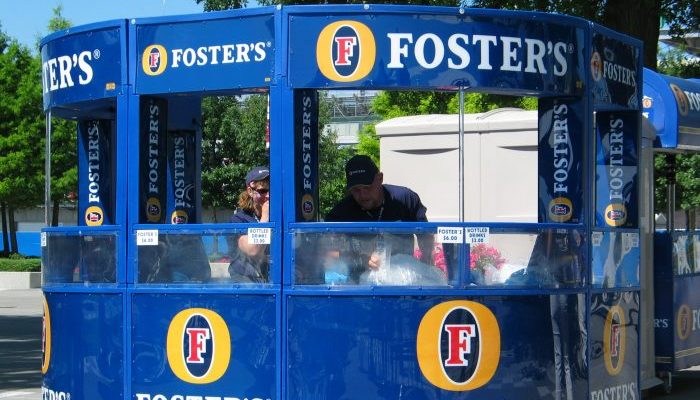
This is a story about how Foster’s went from Australian icon to an orphan in the balance sheet of the world’s biggest brewer in just nine years — the one asset a desperate giant could see to relieve pressure from bankers nervous about a US$1 billion debt pile.
Foster’s is as Australian as football (AFL, that is), meat pies, and Holden cars — but since the days of John Elliott as its boss in the 1980s, it has been an asset that has been milked, abused, sold and shuffled.
The company dabbled in the UK and the US — Elliott was going to Fosterise the world, investing in wine, and even hotels as a passing fad. At one point, BHP was one of the company’s largest stockholders. These ideas and strategies all came and then went as the company battled to survive a legion of dud business decisions.
Since 2011, ownership of Foster’s has changed three times in a business version of pass-the-parcel. Nine years ago, SABMiller, the big South African/UK beer wannabe, came calling and bought Foster’s for A$9.9 billion with an “enterprise value” (which includes debt and is an important figure to remember for later in the story) reported as A$11.5 billion. SABMiller grew and grew until it moved into the sights of another giant global brewer, AB InBev.
In 2016 AB InBev grabbed control of SABMiller, including Foster’s. Because AB InBev borrowed heavily, it was left with around US$100 billion debt which just wouldn’t go away, creating all sorts of problems — in particular a weak share price.
After spending a long time trying to make the SABMiller deal work, AB InBev management started looking for assets to sell in order to raise enough cash to convince its banks that it was in good shape. To do this, AB InBev tried to package up its Asian assets, including Foster’s, and 10 days ago floated the new company in Hong Kong to Asian investors with the aim of raising around US$11 billion cash.
That proved impossible, so the expected price of the shares was cut until the float was valued at US$9.8 billion — but even that proved too high and investors refused to pony up. The float collapsed.
Market reports and analysts think that part of the reason was the presence of the no growth, weak performance of Foster’s compared to the beer brands in growth markets like Vietnam and China that were in the sale. Early last week, Asahi Group Holdings, Ltd. came along and provided an answer to this issue, pitching a bid for an Australian unit of AB InBev’s holdings — which includes Foster’s.
But the mooted sale price announced last Friday is in fact lower than that paid by SABMiller back in 2011. In its statement on Friday, AB InBev said:
Anheuser-Busch InBev has agreed to divest Carlton & United Breweries (CUB), its Australian subsidiary, to Asahi Group Holdings, Ltd. for 16.0 billion AUD, equivalent to approximately 11.3 billion USD, in enterprise value.
AB InBev is being a little tricky. The level of debt in Asahi’s purchase of Foster’s is a mystery: it could be several billion, but we have no way of knowing.
Back in 2011, SABMiller was also tricky — it had a different (lower) value of Foster’s debt. Foster’s said it had a total value of A$12.3 billion, SABMiller claimed it was A$11.5 billion. And then there’s the impact of currency values on the transaction. In late 2011, the Aussie dollar was around parity with the US dollar. SABMiller’s offer valued Foster’s equity at about A$9.9 billion (just over US$10 billion). The “enterprise value” of A$11.5 billion was around US$11.7 billion.
Nearly nine years later, Asahi has paid an enterprise value of US$11.3 billion (around A$16 billion). For a comparison, convert the 2011 values to 2019 value, using 2019 exchange rates (the Aussie dollar is currently worth around 70 US cents). The US$11.5 billion enterprise value in the SABMiller deal back in 2011 equates to a 2019 Australian price of $A16.4 billion, which is slightly more than the $A16 billion given in Friday’s announcement of the Asahi purchase.
Now a few hundred million dollars doesn’t sound very much, but it tells us how badly the Aussie beer market has been and how poorly the company has been run. Inflation in the same period is just over 10%, and while interest rates have fallen so too have sales of Foster’s beers as the Australian draught beer market has contracted.
Foster’s itself has faded, as has Victoria Bitter and Carlton. There are a host of other brands and craft beers AB InBev have bought in Australia to try to rev up sales, but to no avail.
It’s been the same story in the US where AB InBev’s biggest problems are with the sales of Anheuser-Busch beers (Budweiser and associated brands), which have also fallen. That has crimped revenues, profits, and cash flow and made the giant’s bankers nervous — hence the attempted asset sales in Asia, and now the flicking of Foster’s to Asahi, where it will probably rest until it’s then flicked to private equity to run further into the ground.








Crikey is committed to hosting lively discussions. Help us keep the conversation useful, interesting and welcoming. We aim to publish comments quickly in the interest of promoting robust conversation, but we’re a small team and we deploy filters to protect against legal risk. Occasionally your comment may be held up while we review, but we’re working as fast as we can to keep the conversation rolling.
The Crikey comment section is members-only content. Please subscribe to leave a comment.
The Crikey comment section is members-only content. Please login to leave a comment.